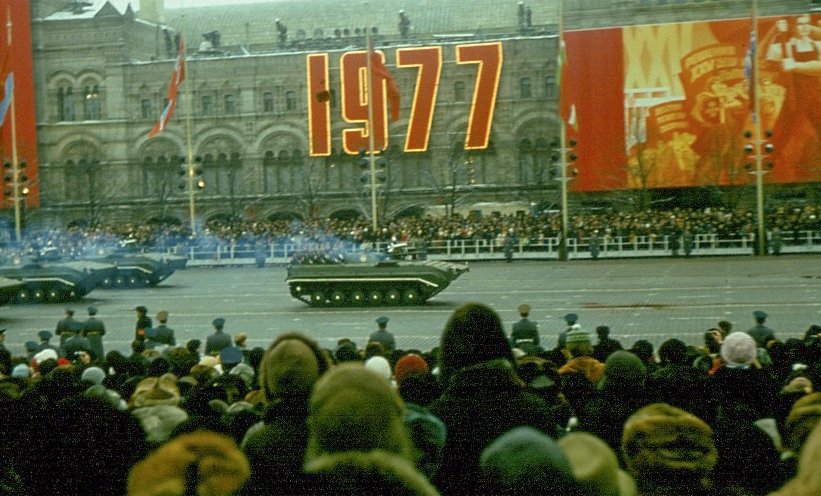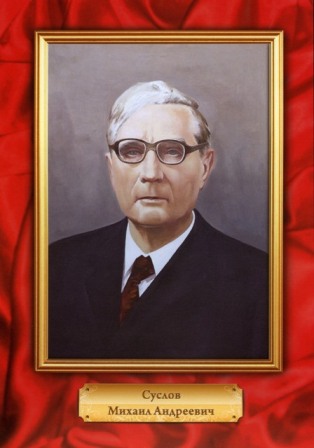The Decade of Ascendency
The Soviet Union in the 1970’s
The 1977 October Revolution Parade, held at a time when Soviet power felt unquestionable.
What Soviet historians call the ‘
Desyatiletiye Druzhby’ (Decade of Friendship)
, but is usually referred to outside the remaining Soviet bloc as the the Decade of Soviet Ascendency, is still widely regarded as a golden age for the USSR and the Warsaw Pact. From the period of the Revolutionary Thaw until 1974, to the early stages of the Second Cold War, the Soviet Union was effectively the worlds single superpower. The UPNA was for much of the decade both unwilling and unable to project power as the US had once done, and while the ideological hetrorthodoxy of the West European revolutions prevented true Soviet dominance of Europe, the division between the North-West and South-West Alliance made them poor competitors to the Warsaw Pact on the global stage. Much of Africa and the Middle East preferred the concrete benefits of Soviet friendship to that of the New Left powers, who were often more absorbed in internal affairs and post-revolutionary civic strife. Though challenges to Soviet hegemony still existed, they were defensive in nature, and both the Party leadership and the general Soviet public had never felt so secure. The spectre of Western Imperial aggression, itself a reflection of the national traumas suffered in the Great Patriotic War, had been seemingly banished. Khrushchev's controversy courting reign had been replaced by the steady hand of "collective party leadership" in the late sixties, and this had over time seamlessly morphed into the familiar spectacle of personal leadership by Mikhail Suslov, who remains popular today amongst Soviet hardliners as the "Pope" of the Eastern Bloc.
Typical images of carefree affluence that often characterise Soviet perceptions of the 1970's.
Largely unaffected by the 60’s energy crisis and by the subsequent market crash, and with the economic reforms of Kosygin beginning to pay off, Soviet citizens enjoyed perhaps the highest standard of living as had yet been possible in Soviet history. State propaganda presented the world revolution as an entirely Soviet achievement, as the payoff of the many sacrifices and struggles of the Soviet people across many decades. To this day many Soviet citizens credit Suslov (or, depending on their politics, Khrushchev) personally for the collapse of NATO and the end of the Wallace-LaMay regime. Bulgaria would be welcomed as the 16th Republic of the USSR with lavish televised ceremonies. The withdrawal of America troops from there many bases across Europe and Asia seemed a confirmation that Soviet military power was the greatest in the world. The 70’s has thus become a favourite setting in Soviet pop culture for romantic comedies and nostalgic coming of age stories, recalling an “innocent” time before the renewed anxieties of the 1980’s. Khrushchev’s already wildly optimistic predictions of an impending transition to Communism now seemed more credible and were parroted with ever more enthusiasm in the Party Congresses of this decade. Nostalgic Soviet commentators bemoan the loss of the sense of community and unity of the 70's, and reactionary Suslovites imagine the period as a perfect utopia betrayed by the weak leadership of his successors.
The Soviet leadership in 1972, shortly before Kosygin's fall from grace.
It goes without saying that from the perspective of those countries who feel victim to Soviet aggression in the 1970’s that it was hardly a “innocent” time, especially in the case of the Soviet invasions of Austria and Greece. Yet the golden glow that Soviets often attach to the 70’s serves not only to blind them from the crimes of Soviet aggression, but also to the various internal problems the USSR experienced in this so-called golden age. Kosygin, the man largely responsible for the successful economic reforms that made the 70’s so-well regarded in Soviet popular memory, spent much of the period under house arrest after being double crossed by his political partner Suslov, after proposing political reforms and a relaxed hold over the Eastern Bloc. It was precisely Kosygin’s downfall that prevented any hope of political reform and genuine diplomatic rapprochement with the West, that laid the basis for the many failures of the 80’s. Suslov’s leadership, though still celebrated in nationalistic circles, is now widely regarded by historians both inside and outside the USSR as being responsible for many intractable long-term problems that plague the Soviet Union today.
Though he rose to power as a critic of personal leadership, Suslov would eventually fully embrace the role of a Stalinist supreme leader, after finding so many of his inner party comrades unreliable and wayward.
Moreover, despite Kosygin’s reforms being a unquestionable success (largely thanks to the introduction of Cybersyn systems from Chile, then still friendly to the Soviet Union), the degree of cheerful affluence we are presented with in Soviet media about the period is highly exaggerated. Though consumer goods were more readily available than they had been before, they were often of poor quality. The very decentralised nature of the Kosygin system laid itself open to huge inequalities between regions, as cronyism and nepotism diverted state resources away from where they were needed to where the apparatchiks wanted them. Though the creation of cooperatives seemed on the surface to provide workers more freedom in the workplace, the lack of political and press freedom to back up this theoretical workplace democracy only served to highlight the gulf between the freedoms enjoyed by the citizens of the First Workers State to that available to those living in the newest. Moreover, while more efficient, the new Soviet economy was becoming increasingly more overtly unequal as the Russian Party bureaucracy took for themselves the lion share of the economic benefit. Some national minorities even became worse off, as under Suslov Great Russian Chauvinism became an increasingly prominent part of Soviet life. While some might have hoped the accession of Bulgaria to the union might herald the dawn of a wider federal Soviet identity, it became increasingly evident that it was a Russian Empire. Chinese and Western accusations of “Social Imperialism” would eventually become harder to shake off. This is to say nothing of the many discontents that existed in the Eastern Bloc countries, especially in the DDR (whose very legitimacy and identity was seriously challenged by the mere existence of the Bundeskommune) and Czechoslovakia (where the scars of the brutal suppression of the Prague Spring were still felt). The very public spectacle of the unprovoked Soviet takeover of Austria is so familiar that it hardly needs to be commented on here.
This obviously didn’t bother many ordinary Russians, especially those who had lived through the many horrors and hardships of Stalinism and the Great Patriotic War and had "never had it so good". Indeed, oral studies of the popular humour of the Soviet people reveal an explosion of patriotic jokes at the expense of Western and Chinese socialism, alongside the usual diet of party officials and rustic national minorities. Such jokes often characterised foreign revolutionaries as pretentious try hards, dumb hedonists or simply as crazy lunatics, who could never live up to the Soviet original. Yet many seeds for future dissent were sown in this period. Many of the care-free youthful characters that populate 70’s nostalgia movies actually spent much of the period frustrated by a regime of cultural and political repression that was growing ever harder to justify in orthodox Marxist-Leninist terms. Many Soviet youth were confused and irritated by laws censuring music and fashion from countries that were revolutionary and socialist, and verbose, patronising state propaganda about Trotskyism and left-deviationism did little to satisfy them. Many Soviet youth longed to travel freely across the world, yet were usually only allowed to engage in heavily regulated holidays to Soviet friendly states. It was in the 70’s that the infamous and often harshly punished pastime of “hitch hiking” from approved Warsaw Pact locations to Paris or London began. Jewish
refuseniks demands to relocate to a now socialist (and in fact broadly Soviet aligned) Israel only intensified as Suslov’s attempts to Russify Soviet Jews accelerated.
A stamp from 1975 celebrates the Soviet liberation of Korea.
Soviet global influence in this period was indeed unparalleled at any time before or since, especially in the early 70's when NWDO was still a pale shadow of NATO. The Chinese were largely surrounded by a coalition of Soviet friendly Asian Communist states who looked to the USSR to shield them from the PRC's extremism and pretensions to regional hegemony, though Japan's passionate attempts to act as a diplomatic bridge between the PRC and the USSR and heal the Sino-Soviet split make it hard to classify as a true ally against China. Ideological hostility between North West and South West was easily exploited, meaning that despite Western Europe being far too difficult to dominate, it was easily contained. The South West Alliance, which lacked a nuclear deterrent, was fairly easy to openly bully until around the mid-70's. The Middle East was at the time almost universally Soviet friendly, though the Ba'athist and Arab Nationalist states were already beginning to grow somewhat weary of close Soviet relations with Communist Iraq and Iran. Africa too was largely an uncontested sea of newly independent states jostling for Soviet approval, and would remain so well into the early 80's. Soviet influence over Finland grew ever tighter, and Fabian India seemed to regard close relations with the Soviet Union as a shield against any internal revolution, Congress ushering the Indian Communist Party into coalition despite it being largely unnecessary from a electoral or parliamentary standpoint. However, by the late 70's the Soviet grip on the globe was already beginning to loosen. Not only were Soviet attempts to limit trade and economic ties between the West and the former Third World unsuccessful, the heavy-handed nature of Soviet tactics incited resentment in former allies. The Soviet Union's grandiose military expenditure, no longer directed at Capitalism or Imperialism but merely at forms of socialism the Soviets disapproved of (or even worse, at nations who wished to leave the Soviet sphere) was rightfully seen as threatening. The continued discontent of the Eastern Bloc and the increasingly shrill nature of Soviet nationalism began to make formerly friendly states cautious of increasing their ties with the First Workers State, and the arrogance of Soviet diplomats in this period is a recurring theme of many a memoir written by those who dealt with them. Beneath the decade of ascendency, lay the beginnings of the Second Cold War, which would begin in earnest soon enough.



